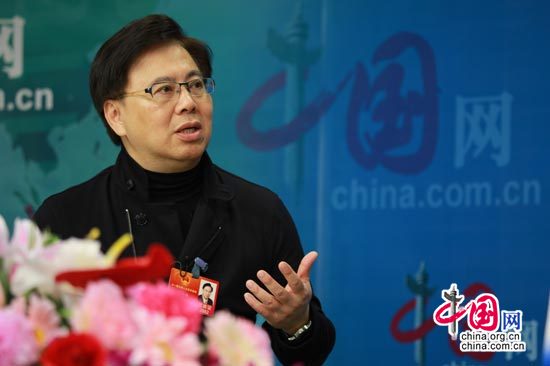HK deputy calls for Basic Law interpretation
- By Lin Liyao & Elaine Duan
 0 Comment(s)
0 Comment(s) Print
Print E-mail China.org.cn, March 16, 2012
E-mail China.org.cn, March 16, 2012
A National People's Congress deputy from Hong Kong has called for the NPC to help resolve disputes over Chinese mainlanders' right of abode in the special administrative region.
|
|
|
Wilfred Wong, a National People's Congress deputy from Hong Kong. |
Wilfred Wong is the executive deputy chairman of Hsin Chong Construction Group Limited and Synergis Holdings Limited. He was among 30 NPC deputies from Hong Kong who submitted a joint proposal to the Standing Committee for the central government's help in addressing the problem, including arriving at a final interpretation of the special region's Basic Law.
Referenced Director of Immigration v. Chong Fung Yuen (2001), Wong said the ruling by the Court of Final Appeal was inconsistent with the NPC's interpretation on the "Basic Law of the Hong Kong Special Administrative Region."
In the controversial case, the court unanimously upheld a lower court ruling that Chinese citizens born in Hong Kong enjoyed the right of abode regardless their parents' immigration status in Hong Kong.
As a result, the Hong Kong government has reported that of the 88,000 births in the region in 2010, roughly 45 percent were delivered by mainland women. Since then, Hong Kong's health department has instituted quotas for the number of births permitted by non-local residents in public hospitals, sparking further debates.
Despite recent controversies, Wong said Hong Kong and the Chinese mainland have become closer ever since the special region's return to the motherland in 1997.
Wong said Hong Kong's local officials have become familiar with China's overall situation and development progress and are playing increasingly important roles on cross-border issues.
More cooperation expected under CEPA
The economic cooperation between Hong Kong and the Chinese mainland saw meaningful growth over the past 15 years, Wong said,
"Most goods imported from Hong Kong to the mainland are duty-free now. More Hong Kong companies would like to expand in the mainland's market, and mainland visitors have become the main purchasing power in Hong Kong."
He said after the Supplement Ⅷ to the Closer Economic Partnership Arrangement (CEPA) signed on Dec. 13, 2011, the service market of the mainland would continue to open to Hong Kong companies, and more cooperation on capital, scientific research and other aspects between the two sides would be deepened.
Hong Kong as a cultural port of China
As chairman of Hong Kong Arts Development Council (HKADC), Wong said he believes Hong Kong could be a platform to present Chinese culture to the world.
"Hong Kong has an international network which can be a bridge for performance and arts groups from the mainland to go outside," he said, insisting that both ancient and modern Chinese culture should be presented to the world.
In the past two to three decades, China's artistic culture saw significant modern development. In the process, many painters, stage performers and art matured and acquired wide renown. Wong said culture activities, such as a Chinese Culture Festival, should be held in Hong Kong to help present to the world an accurate picture of modern China.
Youth exchanges across the region
Young people from the mainland and Hong Kong are getting more chances to connect with each other, deepening exchanges between the two sides. Hong Kong universities enroll students from the mainland every year and in turn swarms of Hong Kong students flock in the mainland universities for study.
However, many Hong Kong students are feeling pressures from the mainland's rapid growth, Wong said. With regard to Hong Kong's export-oriented economy, Hong Kong's youth are resolved in preparing for future challenges.
As the president of the Council of the Hong Kong Baptist University, Wong said the young generation of learners should understand how to get along with others when looking into future exchanges between the Chinese mainland and Hong Kong.
Wong said acquiring knowledge for business and work is about enhancing the ability to networking and establishing good personal relationships. He said the youth of the generation could consider improving their emotional quotients when entering the society.







Go to Forum >>0 Comment(s)